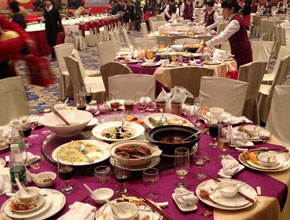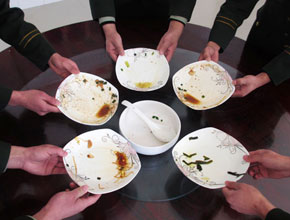|
|
|
The theme for this year's World Environment Day celebrations is Think.Eat.Save. A recently study by the UN Food and Agriculture Organization showed that a third of global food production is either wasted or lost, amounting to 1.3 billion tones and is equivalent to the same amount produced in the sub-Saharan Africa. Food waste is an enormous drain on natural resources and contributes to negative environmental impacts. So think before you eat and help save our environment! |
|
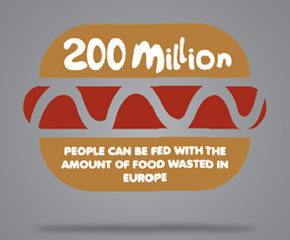 |
The global food production occupies 25% of all habitable land and is responsible for 70% of fresh water consumption, 80% of deforestation, and 30% of greenhouse gas emissions. |
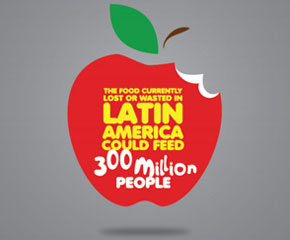 |
|
1 in every 7 people in the world go to bed hungry and more than 20,000 children under the age of 5 die daily from hunger. |
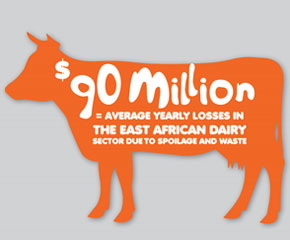 |
Food valued at 200 billion yuan ($32 billion) is thrown away in China every year. The volume is equivalent to the amount consumed by more than 200 million people a year. |
|
Food Waste in China -Statistics show that China wastes 50 million tons of grain annually, accounting for one-tenth of the country's total grain output. It is also estimated that enough food to feed 200 million people, about one-sixth of the country's population, goes to waste annually. -China is still facing challenges in food supply, with national requirements that see only seven percent of the total arable land on Earth feeding 22 percent of its population. -Chinese revelers, many of whom are officials, throw extravagant feasts in restaurants to flaunt their wealth or show hospitality to their guests. Can Chinese save face and save money? -More than 35 million metric tons of grain are wasted every year in China in storage, transportation and processing. |
|
|
| |
|
|
 |
|
|
Ways to Save Simple actions by consumers and food retailers can dramatically cut the 1.3 billion tons of food lost or wasted each year and help shape a sustainable future.
Follow these tips to reduce your "foodprint" and food bill. Buy Funny Fruit—many fruits and vegetables are thrown out because their size, shape, or color are not "right". Buying these perfectly good funny fruit, at the farmer's market or elsewhere, utilizes food that might otherwise go to waste. Zero Down Your Fridge—eat food that is already in your fridge before buying more or making something new, which will save time and money. Follow storage guidance to keep food at its best. Request Smaller Portions—restaurants will often provide half-portions upon request at reduced prices. Compost—composting food scraps can reduce climate impact while also recycling nutrients. Love Leftovers —tonight's leftover chicken roast can be part of tomorrow's sandwich. Diced older bread can become croutons. Be creative! Ask your restaurant to pack up your extras so you can eat them later. Freeze them if you don't want to eat immediately. Very few of us take leftovers home from restaurants. Don't be embarrassed to do so! Donate—non-perishable and unspoiled perishable food can be donated to local food banks, soup kitchens, pantries and shelters. Local and national programs frequently offer free pick-up and provide reusable containers to donors. (by unep.org/thinkeatsave.org) |
|
Saving Habits A-Z It takes only a few simple steps to easily green your daily routine and make good eco behavior into a habit!
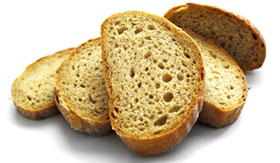 E Eat organic and locally grown foods and help reduce the clearing of forests for agricultural land. F Form a group of peers or colleagues to oversee the food waste at your school, neighborhood or workplace. G Green your office: print double-sided, turn off monitors, start an office recycling program. H Have a vegan (no animal products) dinner party. I Improve the insulation of your home – it will really help your energy consumption…and your monthly bills! J Jog outside and save the energy you would have used on the treadmill! K Keep your cup! When traveling on airplanes, ask to reuse your plastic cup. L Learn more about the environment impact of food production. Did you know that it takes 1,000 litres of water to produce 1 litre of milk? M More food in your pantry increases the risk of food going bad before you consume. N Notify your friends on how their action against food waste could have a huge impact. O Order small food portions first. Better to add on than waste. P Plan in advance. Know what you will need before you go grocery shopping so not to end up buying more food than what will be consumed in your household. Q Quantify how much money you could save each cold winter if you lowered the temperature inside your home by 2 degrees Celsius. It could reduce your energy consumption by 14 percent!
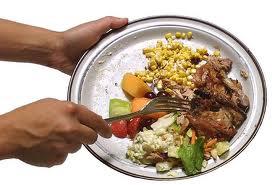 R Reduce. Reuse. Recycle. S Save! Every year, consumers in rich countries waste almost as much food (222 million tonnes) as the entire net food production of sub-Saharan Africa (230 million tonnes). T Think outside of the bottle! Bottled water costs 1900 times more than tap water U Use rainwater for your indoor plants – they love it, and you'll save water at the same time. V Visit the World Environment Day website regularly and see how you can get involved! W Waste not food! 1 in every 7 people in the world go to bed hungry and more than 20,000 children under the age of 5 die daily from hunger. X X-plore the World Environment Day website. Find out more about food waste. Y You can make a difference – individual actions, when multiplied, can make an exponential difference to the planet! Z Zip around town on your bike, on public transport, or walk to a restaurant near you. It's cheaper! (source: unep.org) |

